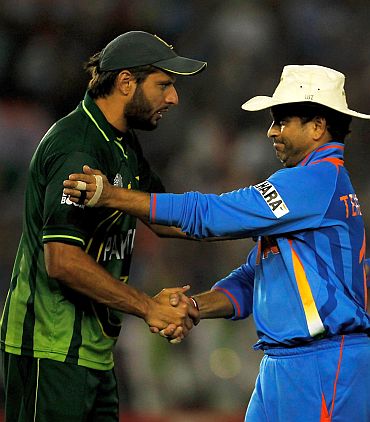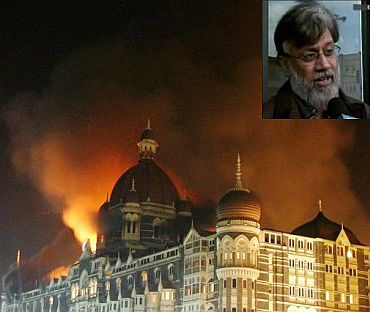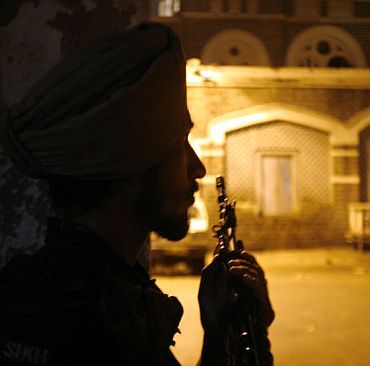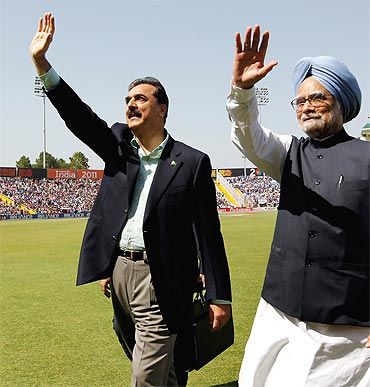 | « Back to article | Print this article |
Rana googly leaves PM on sticky wicket
Freezing or calling off the re-engagement process in the wake of Tahawwur Hussain Rana's confession on 26/11 will be an easy option, but that will take both India and Pakistan back into stewing in their past, feels strategic expert B Raman
In a column written a few hours after the meeting between Prime Ministers Manmohan Singh and Yousef Raza Gilani of Pakistan at Mohali on March 30, I had written as follows: "The goodwill and the benign interest in each other generated by the World Cup cricket semi-final was taken advantage of by our Prime Minister to make the 're-engagement' and 're-connecting' process possible. He should readily accept the reported suggestion of Gilani for a friendly cricket match between the two teams in Pakistan in the near future and visit Pakistan to keep this process of strategic discovery of each other going forward."
Our diplomacy with Pakistan has again entered a difficult and sensitive phase at a time when there were indicators that our prime minister was planning to move the re-engagement process further forward by agreeing to Gilani's suggestion for resuming bilateral cricket ties with the Indian cricket team playing one or more matches in Pakistan.
There are also indications that he might be favourably inclined to visiting Pakistan during one of these matches.
Click on NEXT to read further...
Rana googly leaves PM on sticky wicket
Rana, a US citizen of Canadian origin, whose trial on a charge of complicity with David Coleman Headley (implicated in the 26/11 terrorist strikes in Mumbai) is due to start next month, intends taking up the plea that whatever he did in connection with the 26/11 terrorist strikes in Mumbai was at the behest of the Inter-Services Intelligence and not the Lashkar-e-Tayiba.
His lawyers seems to be enouraging him to take up this plea in order to avoid conviction on a charge of aiding a foreign terrorist organisation so designated under the US laws and to project as a mitigating circumstance his co-operation with the ISI with which the US itself has been co-operating in counter-terrorism.
It remains to be seen whether their contention will be accepted by the court.
Rana googly leaves PM on sticky wicket
This would further show the 26/11 terrorist strikes as an indirect act of war by the State of Pakistan against the State and people of India. Can India sweep this development under the carpet and go ahead with the re-engagement process as if there has been no new negative development in the relations with Pakistan?
To do so would be unwise and confirm the suspicion that in his eagerness to push the re-engagement process forward, our prime minister is prepared to let bygones be bygones and close his eyes to the allegation regarding the involvement of the State of Pakistan.
It will be an act of serious injustice to the memories of the over 160 persons -- civilians and police officers -- killed by the 26/11 strikes. It will further strengthen animosity against Pakistan in the Indian public.
Rana googly leaves PM on sticky wicket
The prime minister will not be able to carry further forward his re-engagement initiative without support from at least sizable sections of the public.
Does this mean that the re-engagement process should be frozen in its tracks till the government of Pakistan takes satisfactory action on Rana's plea either by proving it false or by taking action against the ISI officers involved if his plea is correct?
The verification of Rana's plea and taking the required follow-up action on it will be a long drawn-out process.
The government of Pakistan is not going to admit the ISI's involvement. Rana's plea cannot be conclusively proved without independent evidence gathered by either the Indian or US agencies or by both acting in tandem. The possibility of this is remote.
Rana googly leaves PM on sticky wicket
That is the harsh ground reality facing Indian diplomacy and policy-makers. Freezing or calling off the re-engagement process will be an easy option, but that will take both India and Pakistan back into stewing in their past.
No right-thinking person, who wants to look to a comfortable future without forgetting the lessons of the bitter past, will advocate it with a light heart.
I personally feel it should be possible to keep moving forward on the re-engagement road while vigorously verifying the plea of Rana and pressing for co-operation and satisfaction by the State of Pakistan in this matter.
How to do so will be a difficult test for Indian diplomacy. It should be able to pass this test. We must give it a chance.
This may please be read in continuation of my article of December 23, 2009, titled 'Why investigators need to focus more on Rana'
The writer is additional secretary (retd), cabinet secretariat, Govt of India, New Delhi, and, presently, director, Institute For Topical Studies, Chennai




